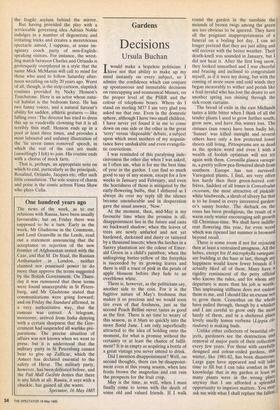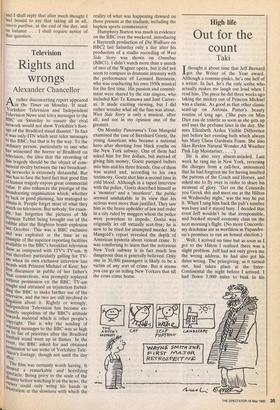Gardens
Decisions
Ursula Buchan
-1- would make a hopeless politician. I 1.have not that ability to make up my mind instantly on every subject, so I admire the confidence which can conjure up spontaneous and immutable decisions on ratecapping and ecumenical Masses, on the proper level of the PSBR and the colour of telephone boxes. Where do I stand on sterling M3? I am very glad you asked me that one. Even in the domestic sphere, although I have two small children, I have never yet found it in me to come down on one side or the other in the great 'terry' versus 'disposable' debate, a subject upon which most mothers of my acquain- tance have unshakable and even evangelis- tic convictions.
I was reminded of this paralysing inde- cisiveness the other day when I was asked, as I often am, what is for me the best time of year in the garden. I can find so much good to say of any season, except for a few weeks in January and February, and even the horridness of those is mitigated by the early-flowering bulbs, that I dithered as I always do over my reply till the silence became unendurable and in desperation gave the usual answer, 'Now.'
At the moment, then, mid-May is my favourite time when the promise is all; disappointment lies in the future and casts no backward shadow; when the leaves of trees are newly unfurled and not yet hardened, darkened and dusty or tattered by a thousand insects; when the larches in a Surrey plantation are the colour of Emer- ald Green in a child's paintbox; when the unforgiving butter-yellow of the forsythia is succeeded by its growing leaves and there is still a trace of pink in the petals of apple blossom before they fade to an overblown white.
There is, however, as the politicians say, another side to the coin. For it is the fugitive nature of May's freshness that makes it so precious and we would soon tire even of that freshness, just as the second Peach Bellini never tastes as good as the first. There is no time to weary of this season, as it blurs so quickly into the more florid June. I am only superficially attracted to the idea of holding onto the moment, for what is promise without the certainty or at least the chance of fulfil- ment? It is as empty as acquiring a bottle of a great vintage you never intend to drink.
Did I mention disappointment? Well, on second thoughts, there can be disappoint- ment even at this young season, when late frosts brown the magnolias and can ruin the prospects for the fruit crop.
May is the time, as well, when I must finally come to terms with the death of some old and valued friends. If I walk round the garden in the sunshine the mounds of brown twigs among the green are too obvious to be ignored. They have all the poignant inappropriateness of a funeral on a boiling hot day. I can no longer pretend that they are just ailing and will recover with the better weather. Their death-knell was sounded in January, but I did not hear it. After the first long snow, they looked unscathed and I was cheerful and bracing and inclined to congratulate myself, as if it were my doing, but with the coming of more snow and cold winds they began inexorably to wither and perish like a frail invalid who has lost the desire to see another spring sun shining through the sick-room curtains.
The bread of exile in the east Midlands tastes a little bitter when I think of all the tender plants I used to grow further south, grow now, and have this winter lost. The cistuses (sun roses) have been badly hit, 'Sunset' was killed outright and several others have only a few protected lower shoots still living. Pittosprums are as dead as the spoken word and even I with a wealth of foolish optimism will not try again with them. Coronilla glauca variega- ta, a pretty yellow pea-flowered shrub from southern Europe has not survived. Variegated plants, I find, are very often less hardy then their green-leaved con- freres. Saddest of all losses is Con volvulus cncorum, the most attractive of pinkish- white bindweeds, a shrub of silvery fur that is to be found in every interested garden- er's sunny border. The dieback on the roses has been prodigious, the result of a warm early winter encouraging soft growth till Christmas-time. We shall have indiffe- rent flowering this year, for even wood which was ripened last summer is browned beyond recall.
There is some room if not for rejoicing then at least a restrained smugness. All the hebes, except for H.microphylla variegate, are budding at the base at last, though mY happiness would know fewer bounds if I actually liked all of them. Many have a rigidity reminiscent of the petty official who knows the rules, and for whom any departure is more than his job is worth. This unpleasing stiffness does not endear them to me, and I should like an excuse not to grow them. Ceanothus on the whole have pulled through, though by a whisker and I am careful to grow only the most hardy of them, and in a sheltered place lovely smelly lemon verbena (Lippia ca- riodora) is making buds. Unlike other collectors of beautiful ob- jects, gardeners see the destruction and removal of major parts of their collection every few years. For those with carefully designed and colour-coded gardens, this winter, like 1981-82, has been disastrous• Large gaps have appeared and will take time to fill but I can take comfort in the knowledge that in my garden at least so many plants were in the wrong place anyway that I am afforded a splendid opportunity to improve matters. You maY ask me with what I shall replace the fallen, and I shall reply that after much thought I feel bound to say that taking all in all, ceteris paribus, at the end of the day, and on balance . . . I shall require notice of that question.















































 Previous page
Previous page